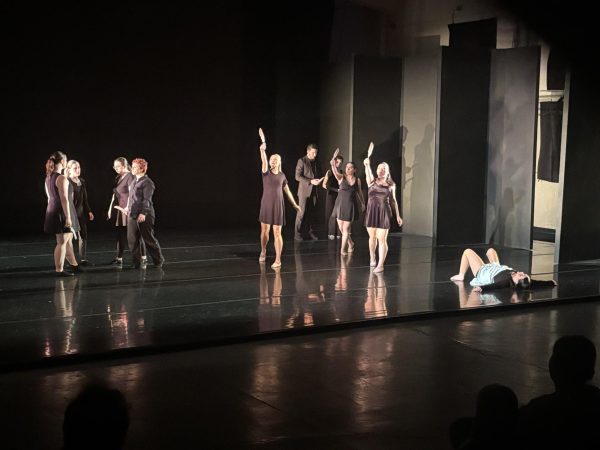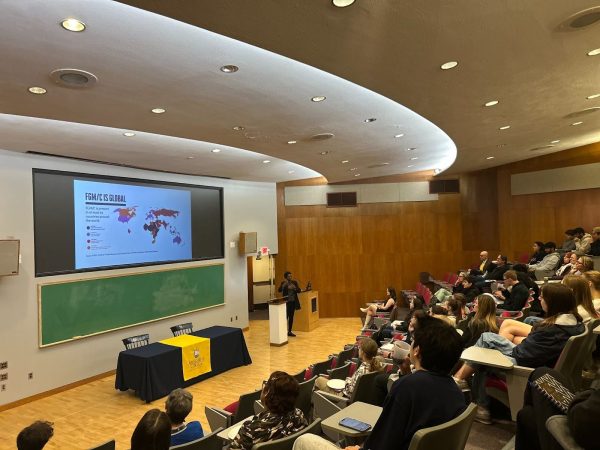The future of the ‘J-Term’ course
According to Dean Ian Binnington, next year there will be another two-module spring semester. Past that, the future of the “J-Term” is still uncertain.
The college achieved its goals of returning students safely and performing a trial run of the three-week intensive module. Questions remain over the three-week module’s post-COVID-19 future.
Dean of Curriculum and Registrar Ian Binnington described the college’s expectations of module one as two-fold. The first objective was to avoid the expected surge in COVID-19 cases that swamped the nation in January.
“We just had an incredibly successful move-in over the past three or four days,” Binnington said. “I am not sure we would have been able to do that in January, for a whole variety of reasons.”
Beyond the logistics of returning to campus during a pandemic, the college also wanted to see how a three-week intensive module would work for the campus community. Though the results are far from clear, Binnington considers the completion of the term a successful trial of the new system.
“Nearly 1,400 students were registered in module one classes,” Binnington said. “The overwhelming majority of those students finished the classes. Grades outcomes for module one were at least as good as you would expect in a regular semester, so there isn’t any cause for alarm there. Anecdotally, some students liked it, some students didn’t. Some faculty liked it, some faculty didn’t.”
To get a larger sense of the student experience during the term, Ron Cole, ’87, provost and dean of the college said the administration is planning to solicit college-wide feedback, and include student leadership in discussions about the results.
“Next week, when we do the student survey, my intent is to have a conversation or somehow include (Allegheny Student Government) in that process,” Cole said. “ASG is fundamentally important to our shared governance for our students, so they ought to be involved.”
Among the students who liked the setup is Jaime Cantillo, ’24. Cantillo used his module one course as an opportunity to expand his academic coursework.
“I want to mostly go into neuroscience and chemistry, which are very math and science-oriented, but the (module one) class I took was more literature-based,” Cantillo said. “I had to read lots of books and write lots of essays. It was pretty fun exploring that and developing those kinds of skills.”
Dawit Kahesay, ’24, thinks that offering a well-rounded education is exactly why the college should continue to offer module one courses in future years.
“We (can) take one course for three weeks straight, just grind it out,” Kahesay said, “Then for the remaining semester, we have the option to take four courses instead of three. Even for people who are trying to finish in three years instead of four years, it will give them more options. Overall, it just seems more logical.”
While a lot of attention has been placed on module one, Binnington also noted that the format for the second part of the semester is also new.
“We’re not really focusing on (this), but module two is also an experiment as to whether or not we can deliver our regular 15-week classes in 12 weeks,” Binnington said.
Part of those regular 15-week classes is the senior composition, the capstone project of Allegheny’s curriculum. Nicholas Woronchuk, ’21, who is submitting his composition in history and biology this semester, likes the way his time is structured during module two.
“My schedule works out much better because I have more free time to do comping,” Woronchuk said.
He would, however, have preferred to have module one to work on his composition as well as his two-credit senior composition class did not run in January.
“I’ve got my work cut out for me,” Woronchuk said. “It’s going to be a little stressful, so those couple extra weeks would definitely have helped better.”
Despite the adjustments, Binnington believes that Allegheny’s standards of higher education are still going to be upheld.
“I have the utmost faith in Allegheny faculty and frankly, in Allegheny students, that they will accept nothing less than an appropriately rigorous education,” Binnington said.
Despite the beginning of vaccine rollouts and drop in COVID-19 cases, Allegheny is still planning to hold a two-module semester in the spring of 2022, citing the lack of certainty with regards to the current pandemic.
“From the COVID point of view, it makes sense to plan for another year with this sort of semester,” Binnington said. “It may be that we do a module one in January of (2022) where students are on campus and not remote. Simply having a module one doesn’t mean that we’re going to remote instruction. That will depend on what the public health circumstances are at the time.”
Once the pandemic has subsided, according to Binnington, it is unclear as to what will happen.
“If we were to do this going forward, we would want to have some conversations about why we’re doing it,” Binnington said. “Once COVID is no longer the reason, why are we doing this? What are the pedagogical advantages and disadvantages? I think the question … about the quality of the education is a paramount question we are always asking ourselves whenever we are doing anything.”
Cole thinks that a permanent module one is an opportunity to expand the student experience at Allegheny and offer a more diverse range of coursework and styles of teaching.
“I’d like us to imagine what these J-Terms would be like beyond the pandemic,” Cole said. “If we could do these in-person, on campus, how does that change the experience? What opportunity does that provide for innovation in the classes that we deliver?”
Binnington sees the current questions as a launching point for new ways of teaching and learning at Allegheny.
“The goal for me wouldn’t be to impose something on students that they don’t want to do,” Binnington said. “It would be to create an experience that students would be excited about participating in. If this is a drag for everybody then what’s the point? I think there’s a real opportunity here, in partnership with students and in partnership with faculty, to think about what we can do that is really Allegheny, that is really appropriate for us, for our student body.”

Sami Mirza is a senior from many different places. He is majoring in International Studies with a focus on the Middle East and North Africa and minor in...






